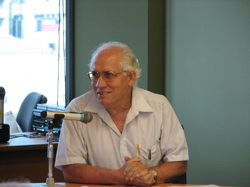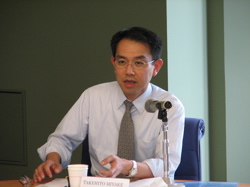Center for Interdisciplinary Study of Monotheistic Religions(CISMOR)Doshisha University
> Archives > 21st Century COE Program Archive > Research Groups > Research Group1 > 2006年度 第2回研究会21st Century COE Program Archive
2006年度 第2回研究会
| Date: | July 29, 2006 (Sat) 13:00-17:00 |
|---|---|
| Location: | Kanbaikan, Imadegawa Campus,, Doshisha University |
| Title: | Secularism and Modernization in Christianity: The Catholic Perspective |
| Speaker: | Michael Seigel (Policy Studies, Nanzan University) |
| Title: | Secularism and Modernization in Christianity, From the Viewpoint of Religious Sociology |
| Speaker: | Takehito Miyake (Associate Professor, School of Theology, Doshisha University) |
| Summary: | |
| In this meeting, Dr. Michael Shiegel from the Catholic perspective and Dr. Takehito Miyake from the viewpoint of religious sociology argued about the theme ‘Secularism and Modernization in Christianity’. While Dr. Shiegel said that the word ‘secularization’ generally means a decline of the influence of religion on various aspects of society, he suspected that secularization can also mean that the Church gains a different kind of power. So he stated that to discuss secularization in Christianity is to ask about suitable relations between religion and society, politics and individuals. Originally, secularization was a product of the Enlightenment. Because thinkers in the Enlightenment trusted reason, so they criticized religion from the side of reason, and because they thought that humans can improve themselves and society and thereby achieve salvation in this world, they understood religion, which claimed the means of salvation for itself, to be useless. Then Dr. Shiegel pointed out a subtle difference of meaning between ‘secularization’ in English and its Japanese translation sezokuka , based on the different origins of each word. Although the meaning of zoku in sezokuka is the opposite of ‘sacred’, the meaning of the Latin seculum, root of the word ‘secularization’, is the opposite of ‘eternity’. A characteristic of secularization in Christianity appears here, Dr. Shiegel said. That is to say, ‘secularization’ is understood to move attention from the next world to this world. By the Middle Ages, Christianity had put emphasis on salvation in the next world, and yet, although religion stresses eternity (the next world), secularization puts the emphasis on this world. ?Finally, Dr. Shiegel pointed out that Catholicism has not always denied such secularization, but, since modern times, has welcomed it. Thus it is seen as a clue to how the Church pays attention to salvation in this world. Understood in this sense, secularization in Christianity means reconfirming the Church’s mission for this world, he said. Dr. Miyake noted that theories of secularization differ in the periods before and after the 1980’s, and he first discussed theories before the 1980’s. He said that modern sociology itself is a product of secularization and has held the view that the importance of religion in society decreases over time. Weber, one of founders of religious sociology, thought that rationalization progresses over human history and that Protestantism released the world from magic and rationally reformed it. Early on, Durkheim had thought that the influence of religion fades away as the form of human inter-connection (solidarity) changes from a mechanical one based on similarity to an organic one based on difference. Dr. Miyake said that the theory of secularization argued actively under modernization and industrialization in the 1960’s understood it as a process necessarily accompanying modernization, that it would develop irreversibly in one direction and that such a European experience is a universal pattern. Yet he also pointed out that the idea of secularization in this time meant various things. At the end of the 60’s, however, there appeared attempts to amend such theories-for example, in Luckmann’s consideration of the privatization of religion. Also, in light of the Iranian Islamic Revolution late in the 1970’s when religion appeared in one political context after another, the theory of secularization couldn’t avoid changing. So theories of secularization after the 80’s take various approaches that abandon the idea of an unavoidable and irreversible change, and point out only expected tendencies for societies to move under certain conditions (Martin), specify the analytical level of ambiguity in theories of secularization until then (Dobbelaere), and so on. In light of this situation Dr. Miyake argued that it is necessary to do empirical research, whatever theory is propounded. Finally, he ended his presentation by pointing out, quoting Wilson, that Protestantism’s response shows five strategies: ecumenism, charismatic renewal, voluntary destructuration, rationalization, and eclecticism. Tomoki Asaka (CISMOR Research Assistant / Graduate Student of School of Theology, Doshisha University) |
|

